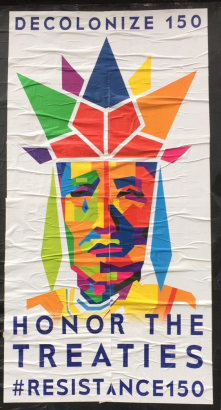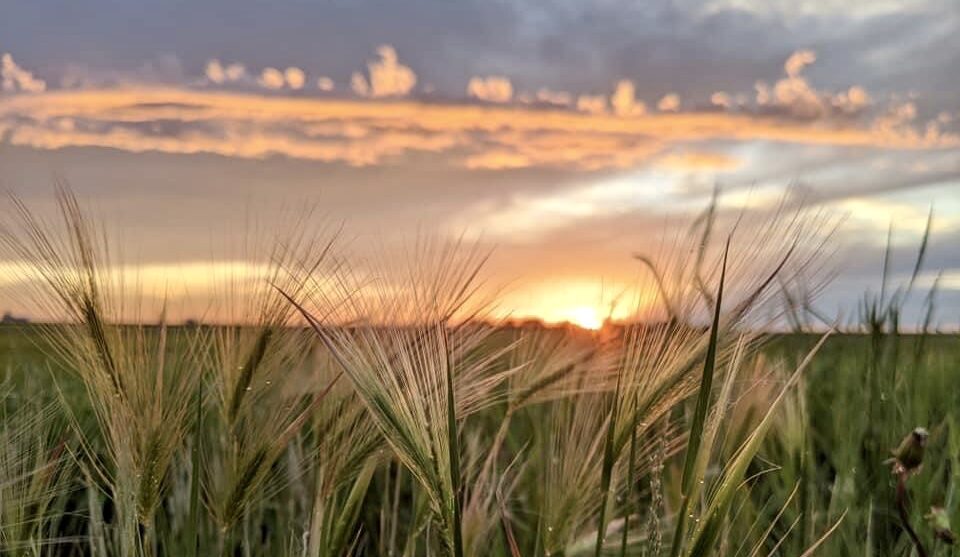I’ve been reading and thinking about Canada 150 quite a bit over the past few months, so this blog post is my two cents on the celebration.
I really started thinking about it when I was in Toronto and everywhere we looked we saw Canada 150 ads, billboards, posters, etc. I saw a Roots poster that said ‘Celebrating 150 years of being nice’ as well as a huge line of people waiting to get their picture taken on the Canada 150 sign at Niagara Falls. It was everywhere – ubiquitous almost to the point of being obnoxious.
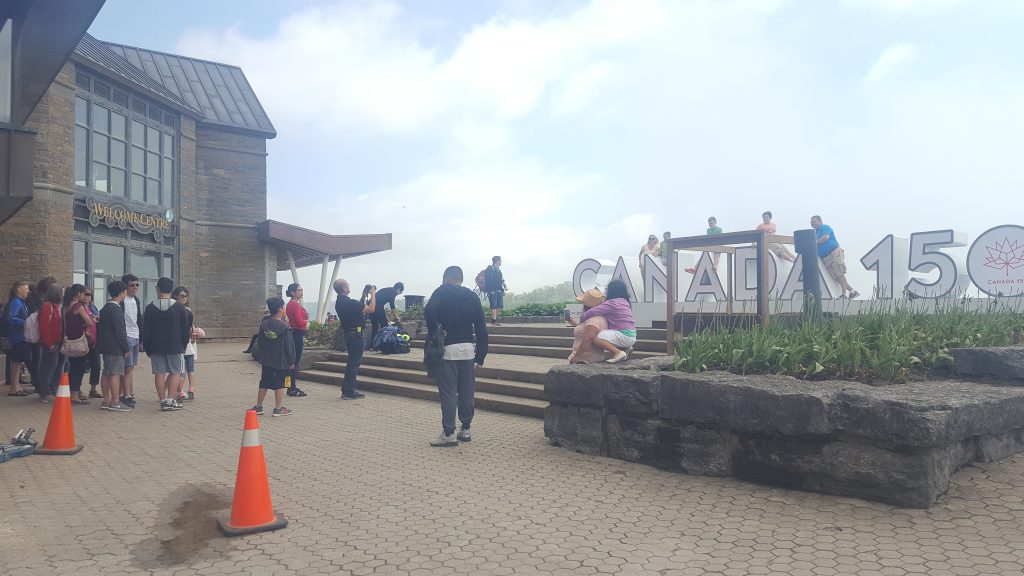
I started talking with some of my colleagues who were in Toronto with me – one of whom wore a Colonialism 150 t-shirt, and two of whom were taking pictures of all the signs so they could use them to start discussions in the university courses they teach – about Canada 150 and the implications of celebrating our country’s anniversary of confederation. I am grateful to have amazing colleagues/friends/ mentors who lead me through these kinds of discussions.
When I got home from Toronto and wrapped up my first year of teaching (reflections on that to come in another blog post), I received this as a gift from one of my students:

So anyway, here is my take (developed through discussions with my colleagues and reading/listening), on Canada 150 for those of you who might be thinking: ‘What’s the big deal?!’
There are a few things that are really problematic about the whole Canada 150 celebration:
1. Our History Sucks
Celebrating 150 years since Confederation is a slap in the face to Indigenous people who have lived on this land for thousands of years, and for whom the last 150 years have been marked by:
- Their peoples dying from diseases brought over by the Europeans, such as smallpox, measles, and tuberculosis
- Dispersion, persecution, and extreme poverty for the Métis people
- Inuit communities being forced to move to isolated and barren lands
- TB epidemics in northern communities
- “Indians and Lands reserved for Indians” being put under control of the federal government (BNA Act/Constitution Act 1867)
- The Indian Act (1876) saying who is ‘Indian enough’ and attempting to control every part of Indigenous peoples’ lives – limiting hunting/fishing, making spiritual ceremonies illegal, placing people on reserves
- Gender discrimination in the Indian Act – status Indian woman who married a non-Indian man would lose her status (including treaty benefits, health benefits, the right to live on her reserve, the right to inherit her family property, and even the right to be buried on the reserve with her ancestors) while a non-Indigenous woman who married an Indian man, she would gain status
- The Pass System – system of racial segregation where First Nations people were not able to leave their community without having a pass approved by the Indian Agent – in effect for over 60 years
- Not being able to vote, get together to discuss their rights, or practice their traditional forms of government
- Being granted ‘enfranchisement’ – losing legal Indian status if they became doctors, teachers, lawyers, soldiers, or went to university
- Residential Schools (cultural genocide – 1820-1996) – First Nations, Inuit, and Metis children being taken from their homes and put in boarding schools run by churches, malnourished, punished if they spoke their languages, sometimes physically and/or sexually abused
- The 60s scoop (1960-1980) – thousands of First Nations and Métis children being forced illegally from their homes and adopted or fostered, usually by non-Indigenous people, many experiencing violence, racism, abuse, and loss of connection to their identity and culture
- The government giving ‘free land’ to anyone who cleared 12 or more acres and built a home – laying 1,600 km of “colonization roads” across Ontario to encourage white settlement of the prairies
- Unfulfilled Treaty promises, stolen land, stolen resources – over 70% of the land set aside for Indigenous peoples in Treaties has been lost/stolen/expropriated – before the arrival of Europeans, First Nations and Inuit people occupied 100% of Turtle Island/what is now Canada – Aboriginal lands today make up 0.2% (less than one half of ONE percent) of the Canadian land mass
… The list goes on. Actually, here is another list of what Canada 150 celebrates:
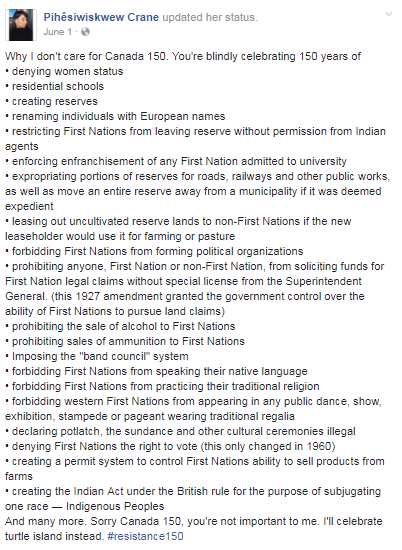
If the government of Canada succeeded in their plan/goal (to “get rid of the Indian problem… to continue until there is not a single Indian in Canada who has not been absorbed into the body politic” – Duncan Campbell Scott, Head of Department of Indian Affairs, 1920), Indigenous people would not be here today. It is only because of the incredible resilience of these people that they are still here despite centuries of efforts to destroy their identities, cultures, and make them disappear. They have continued (and still continue) to resist.
We should be celebrating the resilience of Indigenous people, not 150 years since Confederation.
Pause here and listen to Christi Belcourt’s poem, ‘Canada, I can cite for you 150’. It is a powerful response to Canada 150 and speaks to the incredible resistance and resilience of Indigenous, including Indigenous youth and children.
2. Our Present Still Sucks
Colonialism is ongoing. It’s happening right NOW in many different ways.
- Reserves lack infrastructure and access to essential services – need for repairing/building housing units, need to expand access to mental health programs, need to renovate and build new schools on reserves, many reserves lack essential fire protection
- 150 communities in Canada (most in First Nations communities) have drinking water advisories in place (some have for as long as 20 years)
- The unfathomable number of missing and murdered Indigenous women and girls in Canada
- MMIWG Inquiry – families of victims feel they are being left in the dark by the commission and fear the hearings will leave out some voices
- Indigenous youth are overrepresented in the criminal justice system
- Chronic underfunding of health and social welfare programs for Indigenous children
- Our government continues to discriminate against First Nations children, even after 3 non-compliance orders from the Canadian Human Rights Tribunal
- Canada continuing to extract resources directly from Indigenous nations (often without consultation or consent) – ex: Elsipogtog First Nations community in New Brunswick protested over fracking in their territory – government brought in RCMP to protect unwanted resource extraction, even though Canada does not own this land
- Cleveland’s baseball team still goes by the ‘Cleveland Indians’ and still has the logo of “Chief Wahoo” – a grinning cartoon man with red skin and a feather in his headband
- Canada finally signs on to the UN Declaration on the Rights of Indigenous people but then says adopting it into Canadian law is ‘unworkable’
- RCMP interfere with a peaceful Teepee raising on Parliament Hill, arresting and temporarily detaining 9 people
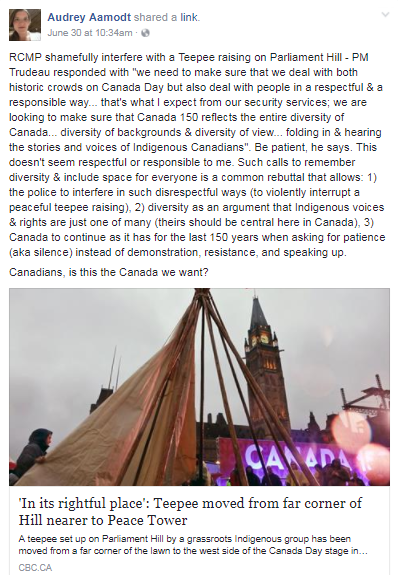
… This list goes on, too. This is why Indigenous people can’t just ‘get over it’ and move on. To be honest, I’m getting very tired of hearing that response from people. Honourable Justice Murray Sinclair responds to this comment much more eloquently than I can:
How can anyone ask a group of people to ‘get over’ something that is STILL HAPPENING? Colonialism is ongoing. As McMahon explains, Colonization Road is a film and a metaphor, but it’s also an actual road (because Canada).
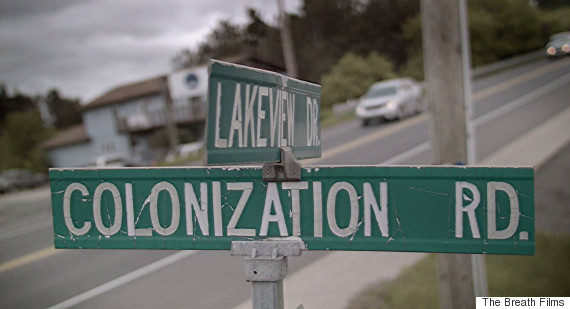
‘This is also why McMahon has been pushing the idea of decolonization before reconciliation.
“It’s never stopped, right? That’s the thing that people really need to understand. Until indigenous people have full control of their lives, it’s just going to go on. It’s like a leaky faucet just drips constantly. It doesn’t stop until you fix it. And we haven’t fixed the colonialism problem here in Canada.”‘
Huffington Post Article: ‘Colonization Road’ Is A Film. It’s Also An Actual Road Because Canada by Joshua Ostraff, 2016
Instead of encouraging Indigenous people to get over it, we should be standing with them in solidarity and outrage that they have put up with this for so long and that it is still going on TODAY.
3. Many of the Celebrations Represent a Narrow and Limited View of History
This article shows how some Canadians (in this case, an immigrant family), are conflicted about whether or not to celebrate Canada 150. The dad who writes this talks about coming to Canada and being incredibly grateful for being able to ‘travel such long distances and not encounter military checkpoints, cross national borders or be pulled over arbitrarily by police’. He also talks about Canada Day as an opportunity to encourage their children to positively synthesize the different layers of their identity – to find harmony between being Canadian, Muslim and Palestinian.
But he also said this year, as he has been learning more about Canada’s colonial history and realizing that all Canadians are shaped by colonialism (some advantaged by it), they decided they would celebrate Canada Day but also do more – attend an event organized by Indigenous activists, replenish their home library with books reflecting Indigenous traditions/stories, reach out to Indigenous friends and let them know they can count on their family as an ally for actionable solidarity. This conversation is also helpful in understanding some of the different perspectives around celebrating the anniversary of confederation.
I get that there are many things to celebrate about living in Canada (especially if you are white and benefit from settler colonialism). We live in an incredibly safe, wealthy country, and we are afforded amazing freedoms and opportunities. These are definitely things worth celebrating and things we should be thankful for. However, it’s important to remember that not everyone has access to those same privileges. There are people in our country who have been systematically denied access to the privileges and freedoms that we often take for granted – provisions that they were promised when Treaties were signed.
When we celebrate the freedoms, opportunities, and choices that we get from living in Canada – when we celebrate being proud Canadians because we are a ‘salad bowl’ rather than a ‘melting pot’ – when we celebrate being the nicest, most polite people around – we are falling into our country’s nationalist myths and reproducing a dangerous narrative that ignores and obscures the hard truths of Canada’s history.
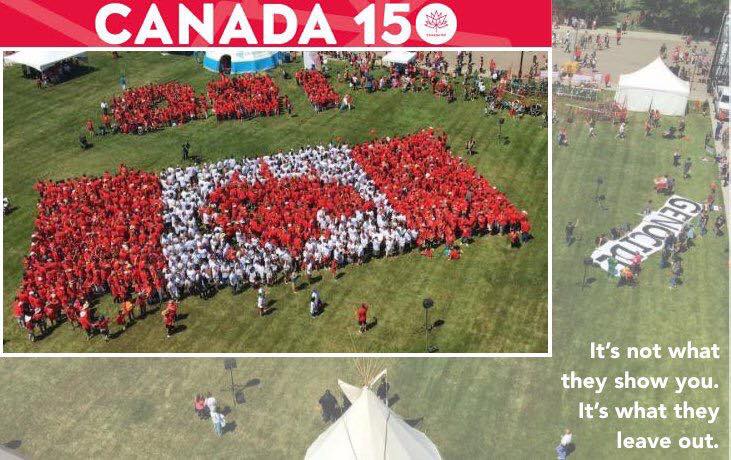
What YOU (and I) Should Be Doing About It
This was my favourite quote from the article I mentioned above:
“On July 1, 2017, my view of Canada will not be limited to the opportunities it afforded me. My Canada includes the parts often unseen and unsung, where there is poverty, substandard housing, water not safe to drink, poor infrastructure, families grieving their girls, mothers and daughters… “ -Idris Elbakri
So I guess that’s what I’m asking of you… Don’t let your view of Canada be limited to the opportunities it has afforded you. Expand your view to include everyone in Canada, especially the First Peoples of Canada. As you reflect on your celebrations, remember that not everyone has something to celebrate. In fact, for many this anniversary of confederation is one of mourning for lost family members, loss of language, and loss of culture.
Finally, I think it’s important to remember that different people will have different ways of dealing with Canada 150 – some will choose to celebrate the resilience of Indigenous people while some will choose to protest and ‘unsettle’ Canada 150. As a settler, I think my job is to accept those responses (without judgment) and LISTEN to those responses.
Start Here
Take a look at a few of these #Resistance150 posts, and start your listening here. This is where the discomfort comes in…
Some of these posts/images will likely make you uncomfortable. Some of them might make you feel defensive, upset, guilty, frustrated, or angry. THAT’S OKAY. Sit with that. Reflect on that. Keep reading. Keep listening.
This is a journey for all of us, and one that is going to take a long time. But it starts here, a few days after Canada 150 – with you.
